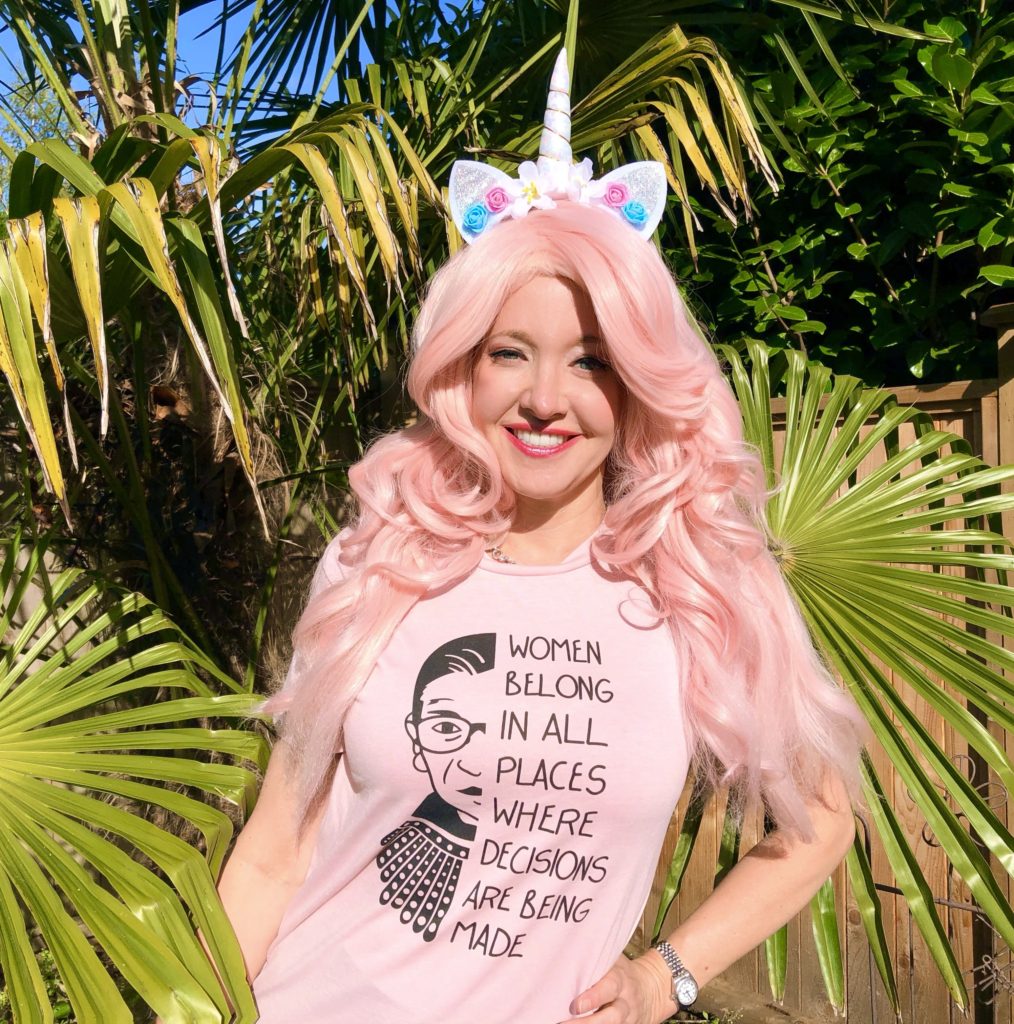It’s Thanksgiving long weekend and my doorbell rings. As I walk over to open the front door, I see a lovely little package from Amazon has been freshly placed on my doorstep. I excitedly bring it inside and peel away the packaging trying to remember what I even ordered, as sometimes I overwhelm myself with all the unicorn treasures I “Add to Cart” in that Amazon jungle of shopping pleasure!
Ahhhh…. but then I see the pink poking through, and I think how perfect it is for this beauty to have arrived on the long weekend where we take a moment in our lives to give thanks. I put on my new T-shirt and give myself a hug to remember, with gratitude, a remarkable woman who spent her life making sure my life and so many others would be better than it was for her generation.
On September 18th, 2020, the world lost Supreme Court associate justice and feminist icon Ruth Bader Ginsburg – the second woman to serve on the Supreme Court and a pioneering advocate for women’s rights in the United States and across the globe. Affectionately known by her supporters as the Notorious RBG, she was a driving force for gender equality and spent much of her career advancing the legal principle that men and women should be equal, and that the law should treat them as such. Over the course of her illustrious life, not only did she change the law, but she also transformed the roles of men and women in society.
The Notorious RBG’s legacy is long
To give you a little background, Ginsburg was one of only nine women attending Harvard Law School back in 1956. At that time, women accounted for less than 3% of the legal profession in the United States. Despite graduating with top grades, no law firm in New York City would hire her. So eventually she went into teaching and, in 1963, landed a job at Rutgers Law School. She soon discovered that her male colleagues were being paid more, and this led to her joining an equal pay campaign at Rutgers, which eventually resulted in salary increases for both herself and other female staff. She then went on to become the director of the Women’s Rights Project at the American Civil Liberties Union (ACLU) in the 1970s, which brought forth changes and protections against gender discrimination.
“I do think that I was born under a very bright star,” Ginsburg said in an NPR (National Public Radio) interview. “Because if you think about my life, I get out of law school. I have top grades. No law firm in the city of New York will hire me. I end up teaching; it gave me time to devote to the movement for evening out the rights of women and men.” And it was her legal crusade for women’s rights that ultimately led to her appointment to the US Supreme Court.
Justice Ginsburg’s vision for women was deemed radical at the time. She wanted men and women to be treated equal, and to erase the functional difference between men and women in society. She wanted to make it clear that there should be no such thing as ‘women’s work’ and ‘men’s work.’ Ginsburg told USA Today in 2009 that, “Women belong in all places where decisions are being made… It shouldn’t be that women are the exception.”
Her work paved the way for the Equal Credit Opportunity Act, that passed in 1974, which allowed women the right to apply for bank accounts, credit cards, car loans and mortgages without a male co-signer. She believed that women deserved the right to financial independence and equal benefits without being held back by artificial barriers.
Ginsburg pushed to have pregnancy discrimination recognized as a form of sex discrimination and contributed to getting the Pregnancy Discrimination Act passed in 1978, acknowledging pregnancy discrimination as unlawful. It was standard practice for women 50 years ago to be fired from their jobs once they became pregnant. She hid her second pregnancy while teaching at law school (by wearing her mother-in-law’s clothes), for fear that she would no longer be allowed to teach. Upon becoming a litigator on the Supreme Court, however, she was given the opportunity to change what was possible by identifying and addressing stereotypes that created unequal and unjust outcomes for women. Thanks to her efforts, women now have greater protection from getting fired, or not being considered for a job, due to pregnancy or future pregnancy plans.
In an article she wrote for the New York Times in October 2016, she said: “Earlier, I spoke of great changes I have seen in women’s occupations. Yet one must acknowledge the still bleak part of the picture. Most people in poverty in the United States and the world over are women and children, women’s earnings here and abroad trail the earnings of men with comparable education and experience, our workplaces do not adequately accommodate the demands of childbearing and childrearing, and we have yet to devise effective ways to ward off sexual harassment at work and domestic violence in our homes. I am optimistic, however, that movement toward enlistment of the talent of all who compose ‘We, the people’ will continue.”
Throughout her lifetime, Justice Ginsburg was a powerful voice for women (and men) in many ways both on a personal and legal level. The legacy she leaves includes the personal freedom to carry out your gender as you so choose, whether you’re a woman working outside the home or a man staying home to care for children… women loving women or men loving men. She was a heroine who continuously took on the hard work and fought the good fight her entire life, while also showing us what it meant to be a fearless, confident and hard-working female leader. She proved that even from a minority position, one could be a powerful voice in dissent in ways that profoundly changed the game. The United States, while not without its imperfections, is unquestionably a fairer, more equal and equitable country as a result of her many contributions.
But if there’s anything that Ginsburg’s legacy has taught us, it’s that we must continue to do the hard work until true equality exists for all. This includes questioning everything you believe goes against equal rights, whether big or small. Let’s step up, call out inappropriate behaviour and take a strong stand for change in all situations that we know aren’t right. After all, sitting back and doing nothing supports the people in the wrong and does nothing to further the vital cause of ensuring equal rights for all.
Thank you, RBG. Rest in peace, sweet angel.

